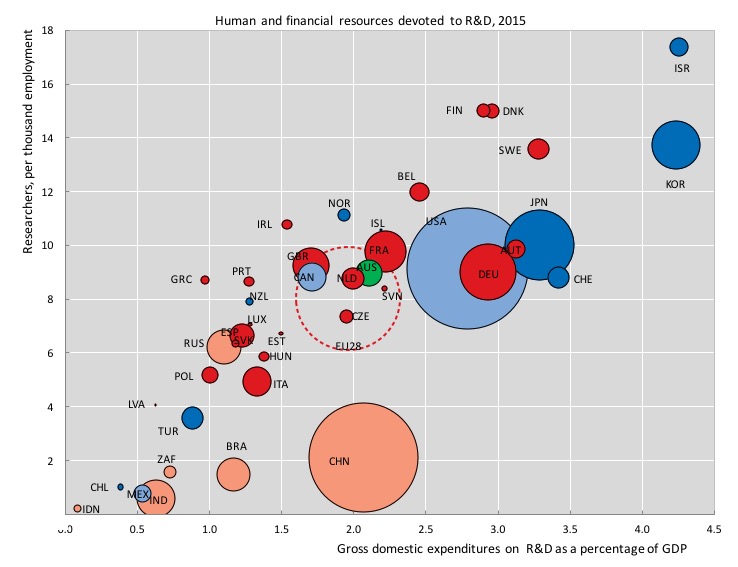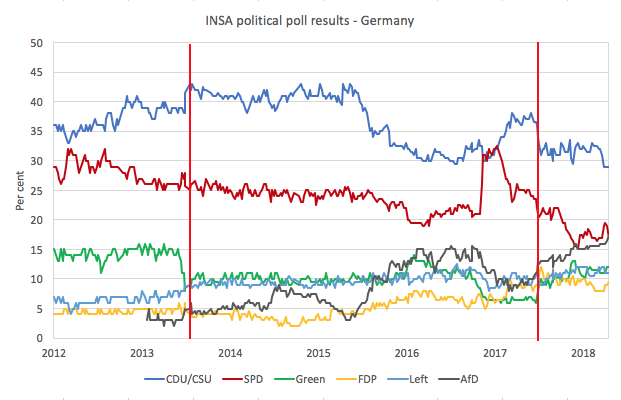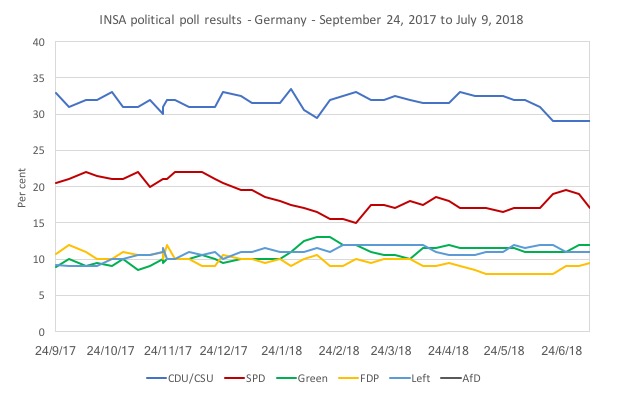It's Wednesday, and as usual I scout around various issues that I have been thinking…
Fiscal policy in Australia is undermining the future of our grandchildren
Its Wednesday, so just a few short snippets that came to my attention, some comedy and some great music that has kept me company today while I have been working today. The first snippet concerns my revelation that fiscal policy in Australia is undermining the future of our grandchildren. Yes, an out-of-control government is spending our way to a future oblivion. The second snippet is my analysis of the latest INSA/YouGov German poll which shows that the euphoria if you can call it that which followed the formation of the GroKo has now dissipated and the AfD have overtaken the SPD in popularity. Which tells you that the progressive movements in Germany are failing. Why? Because they decided not to be progressive and, instead, decided to ape the conservatives. Not a good idea. The polls are showing why.
Fiscal stupidity undermines the future of our grandchildren
Yes, you read that correctly.
The fiscal policies employed by the Australian government are working against the future of our children and their children.
How do I know that?
The peak body representing Australian Universities – Universities Australia (no less) released a statement yesterday (July 10, 2018) – Government and business must rev up R&D or we’ll risk national prosperity – summarising its submission to the upcoming parliamentary enquiry into research funding.
We learn that:
1. “But, over the past three decades, we’ve seen a worrying trend with Governments conducting less and less R&D – and universities have had to step into the breach to maintain national capacity.”
2. “Australia now spends 1.88 per cent of GDP on research and development, well below the OECD average of 2.38 per cent.”
3. “for the first time since records have been kept, OECD figures show that Australia’s business R&D declined in 2015-16”.
4. Even the austerity-trapped British government “has set a target to spend 2.4 per cent of GDP on R&D.”
5. “Australia’s R&D spend as a percentage of GDP is less than Iceland’s. That’s a country with a population smaller than Canberra” (our capital city).
The OECD data is available HERE.
They produced this interesting bubble chart showing total expenditure as a proportion of GDP on the horizontal axis and the Researchers, per thousand employment on the vertical axis.
That little green bubble is Australia. Look who are to the right and above Australia. Much smarter nations than us it seems.
Further examination of the data reveals that:
1. Between 2013-14 and 2015-16, private business R&D expenditure fell by 12 per cent ($A2.2 billion).
This highlights a consistent issue in Australia. The private sector has historically underinvested in research and training, preferring to act as a parasite on the public sector efforts in this regard.
The problem then is that over the neoliberal period, public training and research expenditure has not grown sufficiently and the private sector has not picked up the slack.
Lose-lose all round.
2. Over the same period, total R&D expenditure in Australia fell by 7 per cent ($A2.4 billion).
I have worked in universities for a long time now and have been running a research centre since 1998. That centre has to generate all its own funding, which is not an easy task.
As government spending on tertiary education has slowed, universities have been increasingly relying on researchers to generate external funding, in an environment where funding is scarce and getting harder to access.
The overall result is that Australia will fall behind in innovation and productivity growth and our material living standards will fall.
But it won’t be the top-end-of-town that suffers. Unless we (the people) do something about it, the trend where the top-end-of-town captures an increasing share of national income will continue and the rest of us will be left behind.
Real wages growth has been flat for some years now.
Why is R&D being starved of government funds?
The stupid neoliberal policy mindset is the answer.
In 2008, the federal government set up a large fund to help stimulate research in Australia. Then it got caught up in public opinion which demanded that it also set up the National Disability Insurance Scheme (NDIS), which was to be an improved framework for families struggling with mental and physical disabilities.
Funding both you would think would be a Win-win all round.
But not when the Government thinks it has to run fiscal surpluses and so it cut the R&D allocations to ‘pay’ for the NDIS (which started in 2015) among other things.
Of course, it could have had both.
It has since also gone cold on the NDIS idea because it ‘costs too much’.
Go figure.
I am sure our children and their children will work this out and look back on their parents and grandparents as being absolute mindless dolts.
Social Democratic Party in Germany heading for extinction – hopefully
The latest INSA/YouGov poll in Germany is interesting because it reveals that public opinion now ranks the Social Democratic Party (SPD) below the Alternative for Germany (AfD).
The German general election was held on September 24, 2017.
It took until March for the GroKo (Große Koalition) between the CDU/CSU and the SPD to be agreed. The SPD membership voted to enter the GroKo on March 4, 2018, after their party officials swore they would not.
The new German government resumed office on March 14, 2018.
At the time of the election, the voting patterns were:
| Party | % of vote | Seats | INSA poll % |
|---|---|---|---|
| CDU/CSU | 32.9 | 246 | 34.0 |
| SPD | 20.5 | 153 | 21.0 |
| AfD | 12.6 | 94 | 8.0 |
| FDP | 10.7 | 80 | 9.0 |
| Left | 9.2 | 69 | 11.0 |
| Green | 8.9 | 67 | 8.0 |
Note: The INSA poll was taken on September 22, 2017, two days before the election.
AfD = Alternative for Germany
CDU = Christian Democratic Union of Germany
CSU = Christian Social Union in Bavaria
SPD = Social Democratic Party of Germany
Green = ALLIANCE 90 / THE GREENS
FDP = Free Democratic Party
Left = DIE LINKE
In terms of the INSA/YouGov poll, the AfD was considered more popular in the February 19, 2018 poll and maintained that position for 2 weeks, only to slip back below the SPD, as the latter firmed as the GroKo partner with the CDU/CSU.
But in the latest poll from Monday, the SPD has slipped 2 percentage points (19 to 17 per cent) while the AfD has risen from 16.5 to 17.5 per cent. The CDU/CSU remained firm on 29 per cent, well down on its September election result.
The trend is for growing popularity of the AfD and declining SPD appeal, which was interrupted when it entered the GroKo in early March.
This graph shows the movement in voter intentions from the general election on September 28, 2009 to the latest poll on July 9, 2018.
The vertical red line denotes when the general elections were held.
The respondents were responding to the question: “Who would you vote for if the Bundestag election was tomorrow?”
You can download the entire dataset – HERE.
The patterns are fairly clear.
Here is a more focused view of the same data since the September 24, 2017 election.
The loss in SPD (under the leadership of Martin Schulz) after the election was stunning. There was some recovery in support after Schulz stood down as party chair on February 13, 2018.
The GroKo deal saw a blip in support upwards as Deputy chair Olaf Scholz was installed as the Finance Minister.
But his conservatism and adoption of a new middle name – to wit “Wolfgang Schäuble” – has not helped maintain the SPD popularity. Quite the opposite.
Germans now prefer the hard-right party AfD to the SPD, which has abandoned its ideals and mission.
The recent shift in voting sentiment is not likely to reverse any time soon and demonstrates the bereftness of the social democratic political movement in Germany.
By playing along with Merkel’s conservatives and pushing a strong Europhile sentiment, the SPD has opened the door for the AfD, which is exploiting the hardships that people are feeling as a result of Germany’s economic policies among other things.
The hope for Eurozone reform
And while on Germany, this is very entertaining.
Brooklyn Funk Essentials
Alexandria Ocasio-Cortez is not the only good thing from New York.
Here is one of my favourite bands – Brooklyn Funk Essentials – which:
… is a music collective who mix jazz, funk, and hip hop, featuring musicians and poets from different cultures.
Their first album from 1995 – Cool and Steady and Easy – is a masterpiece. I listen to it regularly and was doing so today.
Here are two tracks from that album.
The first is Take The L Train (To Brooklyn)
And when you get there Take The L Train (To 8 Avenue) – which is my favourite.
That is enough for today!
(c) Copyright 2018 William Mitchell. All Rights Reserved.



“The problem then is that over the neoliberal period, public training and research expenditure has grown sufficiently…”
*Not* grown sufficiently, shurely? ; )
Best, Mr S.
Trump is now doing his best to undermine Merkel. His current claim is that Germany does not pay enough into NATO, which is true, particularly given that it is Europe’s wealthiest country. But he is doing this in his own disruptive way. Trump’s behavior at all times is absurd based on a deeply underlying narcissism, which is possibly one of the reasons he like Boris Johnson, another narcissist, who many people view as an oaf. With respect to both Johnson and Trump, opinion seems to be divided as to whether either of them is intelligent. There seems to be some confusion between what it is to be intelligent and what it is to be ‘educated’, the latter in certain cases enabling you to drop Latin phrases into your commentary. Rees Mogg exhibits the same tendency to parade his classical education. Trump, on the other hand, exhibits no such tendencies for obvious reasons. He simply alienates and creates chaos whereever he goes, unless he is in the presence of aducation.
The left has traditionally been the party that advocates solidarity between the rich and poor within a country. The left has not abandoned this position, but it now also advocates cross-border solidarity between richer and poorer countries, and it therefore supports mass immigration. This is the reason why the left is losing voters to anti-immigration parties. If you defend the welfare state but at the same time want to allow large-scale immigration from countries which have on average far less human capital, then you are proposing contradictory policies. Your immigration policy undermines your commitment to the welfare state. As long as the left refuses to see this, it will continue to lose support.
Moreover, diversity weakens solidarity. Rich Swedes are more willing to pay high taxes if the beneficiaries are other Swedes. When the beneficiaries are immigrants or their children, then their willingness to do so will decrease. One reason why white Americans are more reluctant to support the welfare state is that black and brown people benefit disproportionately from the American welfare state. The more diversity there is within a country, the more identity politics will replace class politics. The left wants to practice class politics but also to promote diversity. They’ll have to learn that this is contradictory.
Suppose that all EU countries had had a policy of zero immigration since WWII, except from other EU countries. There would then be no Front National, no AfD, no Geert Wilders, no Sverigedemokraterna, etc. Unless the left changes its foolish commitment to mass immigration, it will not recover. Instead, we’ll see parties like the AfD and the Sverigedemokraterna grow.
Regards. James
Dear Larry
Nato should be abolished. It has become an extension of the Pentagon. Instead, the EU should end its absurd policy of confrontation with Russia by doing the following:
1 – Lift all economic sanctions against Russia.
2 – Recognize the reunification of Crimea with the Russian motherland.
3 – Advocate a referendum in Ukraine’s 2 Eastern provinces to see whether they want to be part of Russia or part of Ukraine.
4 – End all efforts to include White Russia and Ukraine in the European Union.
5 – Stop the absurd vilification of Vladimir Putin.
If relations between France and Germany are harmonious, there will be peace in Western Europe. If relations are harmonious between France, Germany and Russia, then there will be peace in all of Europe.
Regards. James
Not so sure you are right in the assertion in your final paragraph James, at least since the EU was widened to include former Communist Eastern European countries. Sure they are mostly white and often well educated and with skills that we need, but in many ways “they are not like us” (at least to those who resent their coming).
In the UK, for example, there are now many Poles; white, educated, and filling huge gaps in our skills base, but are probably seen by many as “stealing our jobs”.
“Universities Australia (no less) released a statement yesterday (July 20, 2018) ”
Time-traveling today, I see. I would assume that would make it easy to get funding.
James,
As Mike points out, Europeans can be pretty xenophobic against each other. I know the last couple of years feel like a few decades, but the whole PIGS thing was very insulting (and flat out wrong, of course). If anything, fighting the immigration of brown people is keeping us more together than otherwise – which wouldn’t be massive or very disruptive with proper policy.
“One reason why white Americans are more reluctant to support the welfare state is that black and brown people benefit disproportionately from the American welfare state.”
Absolutely not true James. Black and brown do not disproportionately benefit from the welfare state — that is a racist lie. Inclusion of black and brown people in welfare certainly caused backlash from the white population, but that was due to the racism that had excluded them from it to begin with.
The real issue is how to create inclusive societies that have never been inclusive, and are also fundamentally xenophobic and racist. Your solution, James, would seem to be to entrench the racism and xenophobia and merely exclude those of different colors. Clearly you are comfortable with policies and positions that are racist and xenophobic. Neither Europe nor the US have historically been that homogenous racially — that Europe, particularly central and Eastern Europe are as homogenous as they are today is a product of Hitler’s success in WWII, and then destruction of the Jewish and other communities that were routinely excluded in various ways from full inclusion by the state and society.
I don’t think the left supports mass immigration in the US. When you say the left, you take it you mean party leaders of the democratic party. They are vague in general. We have been trying to figure out what the democrats stand for for quite some time now. If you tell me that the everyday people on the left are for mass immigration, then I’m going to debate you on that.
Anti-immigration parties can’t fix the “immigration problem” without dialing back imperialism, so if people really believe in them to fix the “immigration problem,” they are being conned. period end of story. I can’t stop people for being dumb. The problem of the left is that its run by people who have no balls and pussyfoot around on every issue-not just the “immigration problem.”
I don’t think diversity necessarily weakens solidarity. I have lived in a few places. A place with diversity can have more solidarity between neighbors than a place with none. I think economic alienation weakens solidarity: I’m unemployed/low wage worker, I’m not part of the system, why should anyone listen to me? If you are uneducated, you get shut out easily by economists who use fancy terms. Even though you are right.
People change their opinion all the time. Make America livable again and bring out the best in people and they will change. I think people are much more accommodating than you think when you have real policies that uplifts everyone and bring the best out of people.
The AfD black line is missing from the second INSA graph